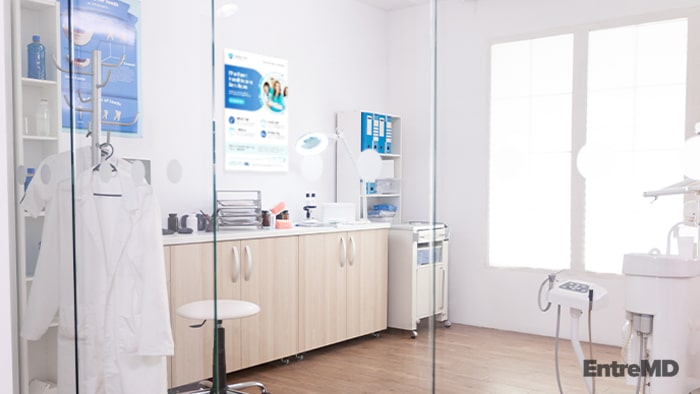As of last year, less than half (46%) of all medical practices are currently operated as private practices. Since the beginning of January 2019, over 108,000 physicians have left these types of practices to work in other healthcare settings. This may well be due, in part, to longer work hours and less EHR satisfaction in private-owned practices.
Physician practices are a significantly different type from other small businesses. It is “intensely personal,” and its revenue comes from “the physician’s knowledge, skill, reputation, and personality.”
In The Physician’s Guide to Selling a Medical Practice, the authors believe none of these skills are “really transferable to the next owner,” so they urge physicians to take the time to identify the specific goals they have for selling. This will help them assess the costs associated with selling to ensure they’re getting what they want and need from a sale.
They identify some common buyers of private medical practices as:
- A new physician
- A small group looking to grow the practice
- A mid-sized or large group hoping to expand to other geographic areas
- A large specialty group looking to expand into a new medical market
- A hospital or healthcare system
Reasons For Selling A Private Medical Practice
There are a variety of reasons why physicians may choose to sell their private medical practices. These can include rising administrative burdens, low and falling payment rates, lack of negotiating leverage, recruitment challenges, IT costs and lack of support, feeling professionally isolated, and a bumpy transition to practice.
As healthcare continues to evolve, physicians face increasing administrative tasks and a changing reimbursement landscape. With more focus on outcomes-based care and increased pressure to manage costs, many physicians find that they are spending more time on paperwork and less time with patients.
In addition, physicians may find that they lack negotiating power when it comes to contracts with insurance companies or hospital systems. This can lead to lower payment rates and difficulty in covering overhead costs.
Recruitment is another challenge faced by many private practices. Finding new physicians to join the practice can be costly and time-consuming, and there may be a limited pool of qualified candidates in certain areas or specialties.
Data management and IT support can also be a challenge for small private practices, especially with the increasing use of electronic health records and other technology tools. It can be difficult to manage and analyze data, leading to challenges in improving patient outcomes and managing costs.

Professional isolation is another factor that may contribute to a physician’s decision to sell their practice. Working in a small private practice can be rewarding, but it can also be isolating. Many physicians find that they miss the camaraderie and collaboration of working with colleagues in a larger healthcare system.
Finally, the transition to practice can be bumpy, particularly for new physicians. There may be unexpected challenges related to starting a new practice, such as managing finances and finding patients. All of these factors can contribute to a physician’s decision to sell their practice.
There’s a lot of work involved in selling a practice, so it’s helpful to first consider how difficult or easy it will be to find a buyer. Issues that might make it harder to find a buyer include:
- Any unresolved legal issues
- Having a non-transferrable lease
- The office is located in a less-than-desirable neighborhood
- The practice has been operating at a loss
On the other hand, a medical practice that has variables making it attractive to a seller will be much easier to sell for a better price:
- A long, stable history in a good location
- Owning the office building
- Great online reputation
- Well-trained, happy, and long-term staff
- Multiple streams of income
When Is The Right Time To Sell?
As a physician, it can be difficult to know when the right time to sell your private medical practice is. There are a few factors to consider before making the decision to sell.
Firstly, it’s important to take into account your personal circumstances. Are you approaching retirement age or looking to pursue a new career opportunity? These are valid reasons to consider selling your practice.
Another consideration is the current state of your practice. Are you struggling financially or feeling burnt out? In these cases, it may be time to sell and move on.

It’s also worth considering the market demand for your specialty. If there is a high demand and low supply for your services, this could be a great time to sell your practice and capitalize on the market.
Finally, it’s important to have a clear exit strategy in place. Knowing your options for transitioning out of your practice and into retirement or a new career can help you determine the right time to sell.
Overall, there is no one “right” time to sell a private medical practice. It’s important to carefully consider your personal circumstances, the state of your practice, and the market demand before deciding to sell.
Common Mistakes To Avoid When Selling A Medical Practice
Some of the common mistakes you’ll want to avoid when preparing to sell your practice are:
Poor timing: One of the most common mistakes physicians make is waiting too long to sell their practice. They wait until they’re burned out, their patients have dwindled, or their staff has become disengaged. Ideally, you should start planning the sale of your practice several years in advance to ensure a smooth transition and maximize the value of your practice.
Overestimating the value of the practice: Many physicians overestimate the value of their practice, assuming it’s worth more than it actually is. They often ignore the fact that a practice’s value is determined by its revenue, assets, patient base, staff, and goodwill. Before selling your practice, make sure to get a professional appraisal and determine its real value.

Lack of confidentiality: When selling a practice, it’s important to keep it confidential to prevent any disruption to patients, staff, and competitors. Many physicians fail to maintain confidentiality, and this can harm the practice’s reputation and value. Be sure to work with a trusted broker who can manage the confidentiality of the process.
Ignoring regulatory requirements: Selling a practice is a complex legal process that requires following a specific set of regulations. Some physicians overlook these requirements and can put the sale of their practice at risk. Be sure to work with a lawyer with experience in practice sales to help ensure compliance with all applicable laws.
How To Prepare For Selling Your Practice
The more time you spend preparing your business for sale, the better chance you have of finding the right buyer in a timely fashion. Selling can be an overwhelming and emotional decision, but with proper preparation, it can also be a smooth and successful transition.
Here are some steps you can take to prepare for selling your practice:
Assess your finances: Before selling your practice, it’s essential to understand the current state of your finances. Get a complete financial overview, including your current assets, debts, accounts receivable, and inventory. Understanding your financial situation is crucial for setting realistic expectations for the sale of your practice.
Evaluate your practice operations: The more organized and efficient your practice is, the more appealing it will be to potential buyers. Ensure that your practice operations, including billing, accounting, and patient records, are up-to-date and running smoothly. Conduct a thorough evaluation of your practice to identify areas for improvement and implement necessary changes before putting it up for sale.

Get your practice valued: Determine the fair market value of your practice by working with an expert appraiser. An appraiser can take into account various factors, such as your practice’s revenue, expenses, and location, to arrive at an accurate valuation. This step is crucial to setting a reasonable price for your practice and ensuring you get a fair return on your investment.
Build a transition plan: Selling your practice is not a one-time event; it’s a process that requires careful planning and execution. Work with your team of advisors, including lawyers, accountants, and financial advisors, to build a comprehensive transition plan that covers every aspect of the sale. Your transition plan should include a timeline for the sale, your roles and responsibilities during and after the sale, and how to address any unexpected issues that may arise.
Keep your practice running: While preparing to sell your practice, it’s vital to continue operating as usual. This includes ensuring that your staff is fully trained and ready to handle any challenges that may arise. Maintaining the integrity of your practice will make it more attractive to potential buyers and can lead to a more successful sale.
Prepare Your Documentation
One of the biggest areas you’ll need to have organized when selling your practice are all necessary documents. This documentation not only ensures a smooth transaction but also protects both parties involved.
Legal documents: Before sharing details about your practice, prepare confidentiality and non-disclosure agreements for potential buyers.
Business records: Your business records should be up-to-date and organized. These records should include the practice’s financial statements, income tax returns, contracts, and agreements. Buyers will want to see at least three years of financial statements to gauge the profitability of your practice.
Accounts receivable: Your accounts receivable report should be reviewed and collected before you sell your practice. Buyers who purchase your accounts receivable buy the right to collect unpaid balances. Make sure you review your accounts receivable policies with your lawyer or financial advisor.
You must have contracts with your patients, employees, and any other third parties in writing. You will need to review each contract to make sure that there are no clauses preventing you from selling your practice.

Licenses and permits: You will need to provide evidence that your medical practice has all of the licenses and permits required to operate. These documents should be up-to-date and maintained by your practice manager.
Insurance coverage: Make sure that all your insurance policies are current, including medical malpractice insurance. You will also need to disclose the nature of your malpractice insurance coverage to any prospective buyer.
Patient data: Your patient data, including patient records, must be kept confidential. Make sure that you have a signed confidentiality agreement with any potential buyer.
Give Your Office Space A Critical Overview
It’s important to thoroughly evaluate the physical office space, and inventory is important. This step will help you assess the overall value of your practice and ensure that everything is in good working order before the sale.
Start by conducting a thorough inventory of all medical equipment, furniture, and supplies. You should note any items that need repair or replacement and address those issues before the sale. You don’t want any surprises or unexpected expenses for the buyer after the sale.

Next, consider the condition of your office space. Are there any areas that need painting, carpet cleaning, or other maintenance? Take the time to freshen up your space and ensure it looks clean and professional. This can go a long way in attracting potential buyers and increasing the overall value of your practice.
Consider the technology and software systems in your practice. Are they up-to-date and functioning properly? A prospective buyer will want to see that your systems are reliable and efficient, so be sure to address any issues.
How To Advertise And Market The Sale Of Your Medical Practice
The best way to attract potential buyers is by effectively marketing and advertising your practice.
Work with a broker: If you’re not confident about marketing your practice yourself, you may want to consider working with a broker specializing in selling medical practices. They have experience in the process and can help you market your practice more effectively.
Advertise on healthcare job boards: Healthcare job boards like MedZilla and HealthECareers offer sections for practices that are for sale. This can help you get your listing in front of the right audience.
Use social media: You can also use social media to reach out to potential buyers. Post on your practice’s social media accounts that you’re selling and share the listing with your followers. You may also want to consider advertising on LinkedIn, a popular platform among healthcare professionals.

Ask for referrals: Reach out to colleagues, employees, and patients who may know someone interested in buying a medical practice. They can help spread the word and connect you with a potential buyer.
Use local newspapers and publications: You may also want to consider placing ads in local newspapers or healthcare publications. This can help you reach a wider audience and attract local buyers.
When advertising your practice, include all relevant information, such as the location, size, type of practice, number of patients, staff size, and financial information. This will help potential buyers assess whether your practice is the right fit for them. It’s also important to ensure that your advertising complies with any laws or regulations governing the sale of medical practices in your area.
Choosing to sell your private medical practice is a big decision and one that will take serious time and energy. I’d love to hear some of your reasons for selling your practice or your reasons for staying in private practice.
Email me at hello@entremd.com and let me know about your journey — we’re all working towards a life where we can live life and practice medicine on our own terms.

